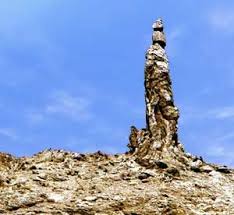Lot’s Wife
Her character: She was a prosperous woman who may have been more attached to the good life than was good for her. Though there is no indication she participated in the sin of Sodom, her story implies she had learned to tolerate it and that her heart had become divided as a result.
Her sorrow: That her heart’s choice led to judgment rather than mercy, and that she ultimately refused Yehovah God’s attempts to save her.
Key Scriptures: Genesis 18:16-19:29; Luke 17:28-33
Her Story
Lot’s wife had only hours to live, though she never suspected it. She must have gone about her business as usual, tidying the house, cooking and kibitzing with the neighbors, unaware of the tragedy about to overtake her.
Years earlier she had married Abraham’s nephew, and the two had amassed a fortune in land and livestock. Eventually, they settled in Sodom, uncomfortably comfortable in a city so wicked that heaven itself dispatched angels to investigate the allegations against it.
Lot, it so happened, was at the city gate at the very moment the angels arrived. Greeting the strangers, he quickly implored them to spend the night in his home, anxious about what might happen to them once night had fallen.
Lot’s wife must have welcomed the strangers warmly, too, for hospitality was a sacred trust in the ancient world. Then, just before bedtime, she would have heard the voices. At first a few muffled words and then echoing laughter and finally an ugly clamor as a noose of men tightened around the house. Rough voices shouted for her husband to open the door and surrender his guests to their sinful pleasure.
“No, my friends. Don’t do this wicked thing!” Lot screamed back. But the crowd was furious for its own way. Then he attempted an appalling bargain. “Look, I have two daughters (virgin) who have never slept with a man. Let me bring them out to you, and you can do what you like with them. But don’t do anything to these men, for they have come under the protection of my roof.” But the men of Sodom would not be thwarted and rushed the door to force their way in.
Suddenly, the angels reached out, pulled Lot back into the house, and struck the men at the door with blindness. Then they turned to Lot, urging him, “Do you have anyone else here—sons-in-law, sons or daughters, or anyone else in the city who belongs to you? Get them out of here, because we are going to destroy this place.” But Lot’s sons-in-law thought he was joking and refused to leave.
At dawn the angels again urged Lot to hurry lest he and his wife and daughters perish with the rest of the city. Still, the family hesitated until the angels finally grabbed their hands and dragged them out, urging, “Flee for your lives! Don’t look back, and don’t stop anywhere in the plain! Flee to the mountains, or you will be swept away in the punishment of the city”!
By the time Lot and his family reached the small city of Zoar, the sun had risen over the land and everything in Sodom was engulfed in burning sulfur. Men, women, children, and livestock were all obliterated. A terrible judgment for terrible sin.
But the judgment was even worse than either Lot or his daughters first realized. Safe at last, they must have turned to each other in relief at their escape and then turned again in shock, realizing one of their number was missing. They would have searched, hoping against hope, until they finally caught sight of the white salt pillar, silhouetted against the sky, a lonely monument in the shape of a woman turning around toward Sodom.
If you have ever seen pictures of ancient Pompeii, destroyed by the eruption of Mount Vesuvius in ad 79, where human shapes are preserved to this day by the lava that stopped them dead in their tracks, you might imagine the disaster that overtook Lot’s wife.
Why did she turn, despite the angel’s clear warning? Was her heart still attached to everything she left behind in the city—a life of comfort, ease, and pleasure? Did she still have family trapped in the city? Or was she fascinated by the tragic spectacle taking place behind her, like a gawking motorist at the scene of a bloody accident? Perhaps all these things combined were a glue that caused her feet to slow, her head to turn, and her body to be overtaken by the punishment Yehovah God had meant to spare her. By her own choice—her very last choice—she cast her lot with judgment rather than with mercy.
Yeshua (Jesus) urged his followers to remember Lot’s wife: “It will be just like this on the day the Son of Man is revealed. On that day no one who is on the roof of his house, with his goods inside, should go down to get them. Likewise, no one in the field should go back for anything. Remember Lot’s wife! Whoever tries to keep his life will lose it, and whoever loses his life will preserve it” (Luke 17:30-33). Sobering words recalling a sobering story. Words meant to lead us away from the compelling illusions of wickedness and safe into the arms of mercy.
Her Promise
Earlier, Yehovah God had promised Abraham he would spare the city of Sodom if he could find only ten righteous people in it, but not even ten could be found. So Yehovah God sent his angels to Sodom to rescue Lot and his family (Genesis 18-19) from the coming destruction. Hesitant to the last minute, the angels had to take Lot, his wife, and his two daughters by the hand and lead them out of the city.
Did Yehovah God know Abraham was thinking of Lot when he begged for the cities to be spared if fifty, forty-five, thirty, twenty, only ten righteous people could be found? Was God’s mercy extended to Lot for love of Lot or for love of Abraham? We don’t know. But we do know Yehovah God’s mercy was available for Lot and his family. And his mercy is available to you as well, even in the worst of times, the most difficult situations, the hardest of circumstances. He’s there, stretching out his hand to lead you to safety.



0 Comments